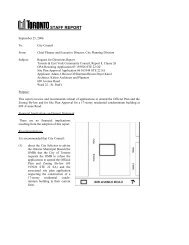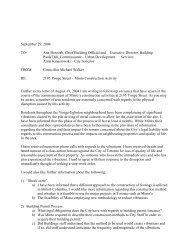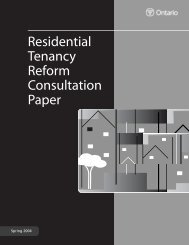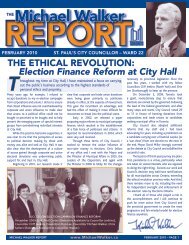Residential Tenancies Act: Briefing Book - Michael Walker
Residential Tenancies Act: Briefing Book - Michael Walker
Residential Tenancies Act: Briefing Book - Michael Walker
You also want an ePaper? Increase the reach of your titles
YUMPU automatically turns print PDFs into web optimized ePapers that Google loves.
<strong>Residential</strong> <strong>Tenancies</strong> <strong>Act</strong>, 2007<br />
B R I E F I N G B O O K<br />
Facts on Social Housing<br />
What is Social Housing?<br />
Social housing is rental housing for individuals and families with low incomes. This<br />
housing has been developed and is operated with financial assistance from government.<br />
Rent in social housing is generally set at 30% of gross income, with adjustments for<br />
utilities.<br />
Social housing takes various forms, including:<br />
• private non-profit housing;<br />
• co-operative housing;<br />
• municipal non-profit housing; and<br />
• housing administered under Private Rent Supplement Agreements, the Limited<br />
Dividend Program, or Housing Allowance Programs.<br />
Private non-profit social housing buildings are owned and operated by community-based<br />
non-profit corporations, such as churches, seniors’ organizations and ethno-cultural<br />
groups.<br />
Co-operative social housing residents elect a board of directors from their members and<br />
contribute to operations and life of the community through a range of volunteer activities.<br />
Co-operative housing is governed by the Co-operative Corporations<br />
<strong>Act</strong> (not the <strong>Residential</strong> <strong>Tenancies</strong> <strong>Act</strong>). Some urban native programs operate as private<br />
non-profit housing for Aboriginal people.<br />
Municipal non-profit housing is owned and operated by a municipal government. In<br />
Toronto, it is the Toronto Community Housing Corporation (TCHC), which is owned by<br />
the City and governed by a board of directors appointed by Council. The TCHC reports<br />
to Council each year on how it has put its Community Management Plan into action. The<br />
TCHC manages a portfolio of about 58,200 rental units, including those built by its two<br />
predecessor municipal non-profit housing corporations (Metro Toronto Housing<br />
Company Limited and Cityhome), as well as the public housing stock transferred from<br />
the former Metro Toronto Housing Authority.<br />
Private non-profit housing and municipal non-profit housing are exempt from certain rent<br />
rules (i.e. annual rent increases and above-guideline increases) and certain rules<br />
governing the landlord and tenant relationship (i.e. sublet/assignment). If the tenant is<br />
paying a rent geared to income, the 90-day rule for giving notice of rent increase before<br />
the date of the intended rent increase does not apply and there can be less than 12 months<br />
between rent increases.<br />
45






